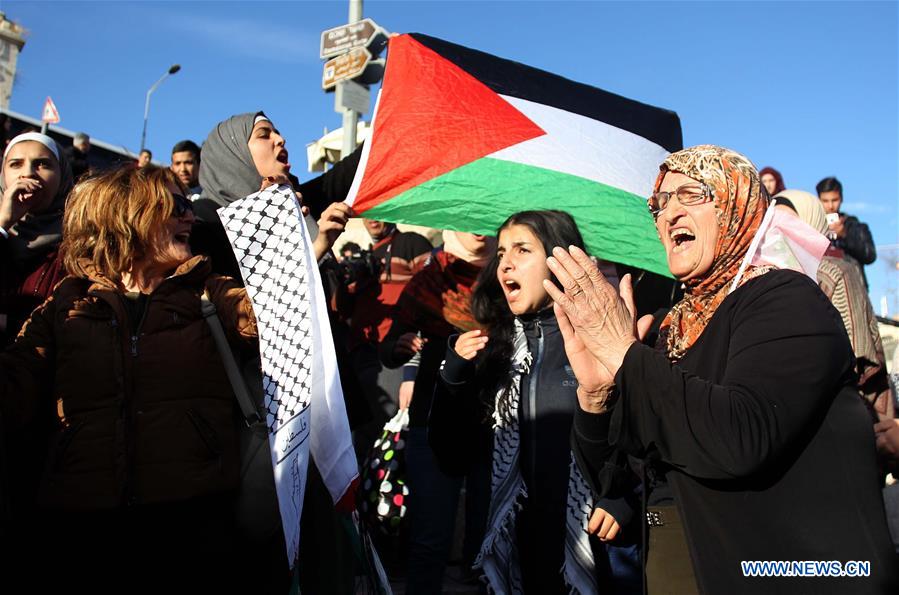
Palestinians participate in a protest against U.S. recognition of Jerusalem as the capital of Israel, near Damascus Gate of Jerusalem's Old City, on Dec. 11, 2017. (Xinhua/Muammar Awad)
BEIJING, Dec. 16 (Xinhua) -- Experts on the Middle East have called on the United States to stop adding fuel to the fire in the conflict-stricken region, and made some suggestions on how the relationship with Palestine could be improved.
On U.S. President Donald Trump's decision to officially recognize Jerusalem as the capital city of Israel, Wu Sike, China's former special envoy to the Middle East, said the Middle East region has been suffering from conflicts, turbulence and instability for several years, referring to Libya, Syria and Iraq.
The United States needs to do something conducive to easing tensions between Palestinians and Israel and play a responsible role in the region, he told Xinhua at an event held on Friday in Peking University to mark the International Day of Solidarity with the Palestinian People.
The observance, organized by the United Nations, is held annually on Nov. 29 to draw international attention to the unresolved Palestinian cause.
Some U.S. scholars see more severity in Trump's move. Brookings Institution senior fellow Darrell West has told Xinhua recently that "His (Trump's) action complicates relationships with Islamic countries in many places around the world. They think the United States is being one-sided and is not a fair arbiter of Mid-Eastern policy."
"If the president only recognizes Israel's claim to the city ... his decision will be universally condemned in the region and globally," Dalia Dassa Kaye, director of the Rand Center for Middle East Public Policy, told Xinhua.
China's new thinking on the Middle East issue -- promoting peace through development -- was clearly reflected in China's new moves on the Palestine-Israel issue, Wu said.
Palestinian Ambassador to China Fariz Mehdawi, who attend the observance, spoke highly of a four-point proposition which was put forward by Chinese President Xi Jinping in July during a meeting with his Palestinian counterpart Mahmoud Abbas in Beijing.
The four-point proposition was mentioned by Xi for the first time in a speech delivered at the headquarters of the Arab League in Egypt in January 2016, Wu said, adding Abbas' visit made this new thinking clearer.
The Belt and Road Initiative could help regional development and would dovetail with Arab countries' development strategies, namely the 2030 economic visions of Saudi Arabia, Lin Fengmin, vice director of the Center for African Studies with Peking University, told Xinhua on Friday at the observance.
He hoped Palestine could take advantage of China's development and achieve its own progress in economy, society and infrastructure.
Mehdawi had a similar opinion. He expressed the hope to expand cooperation with China in such areas as economy, investment and tourism, and to learn from China's experience in sustainable development.
Wu said Palestine and other Arab countries are situated along the Belt and Road, and thus they are natural cooperation partners for China. "There is great cooperation potential in infrastructure, industrialization and employment," he said.



